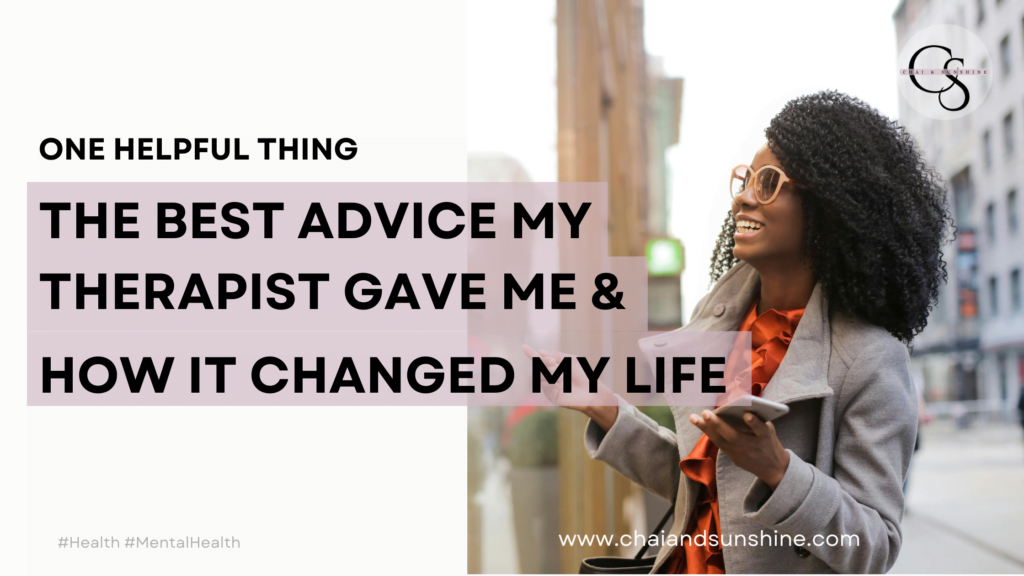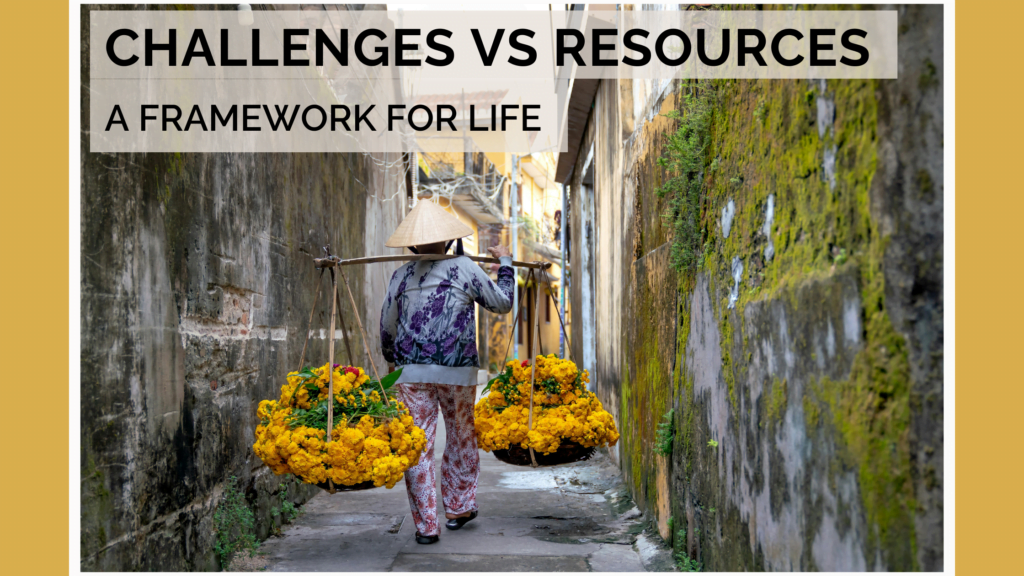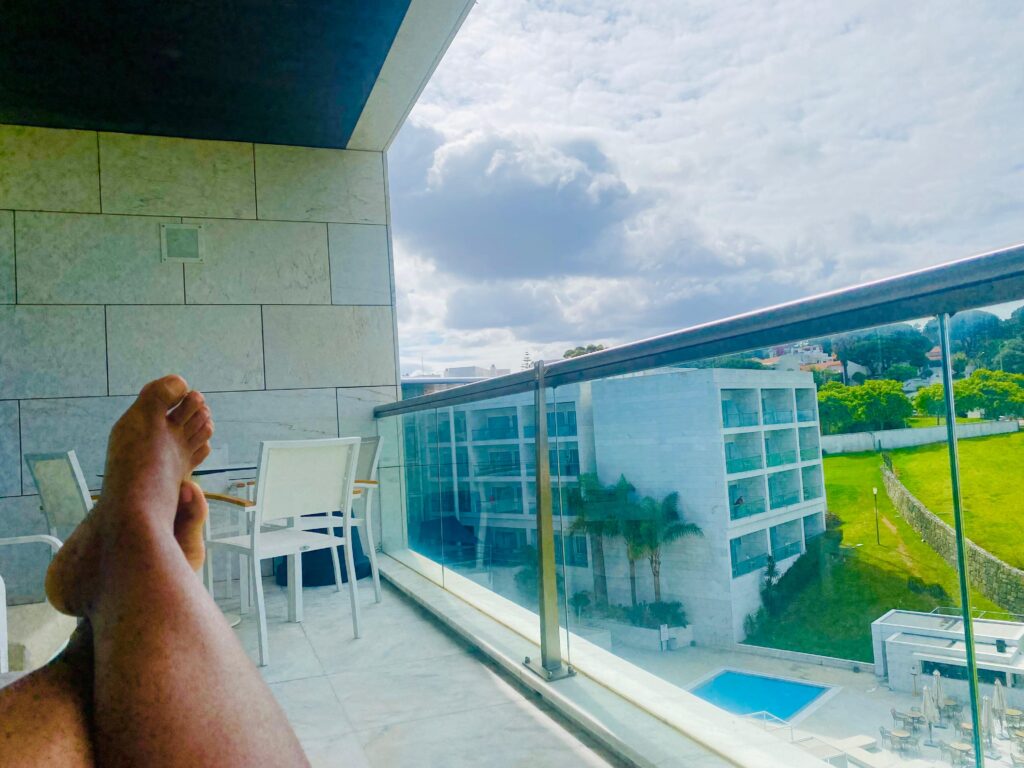
If you would’ve told me a year ago, that I’d be writing about “my therapist’s best advice”, I would have laughed in your face!
I was never going to therapy!
Hah!
How self-indulgent.
Sure, I was miserable, but I would handle my own misery. No one would be able to help me with that.
So, to say that I wholly swallowed the stigma surrounding therapy and psychiatric medication would be an understatement.
To me, it was an admission of weakness.
A last resort for those who “can’t handle things themselves.”
Besides, I was always the one who gave the best advice. And I had plenty of advice left over for me.
But let me tell you, the best advice I ever took was walking through those therapist’s office doors.
Therapy isn’t just for people in crisis (or, in my case, people who hadn’t realised they were in crisis).
Therapy is a toolbox for anyone who wants to navigate life’s challenges more effectively.
Here’s why:
Table of Contents
ToggleThe Best Advice I Ever Took Was Going to Therapy
All the crappy decisions I might’ve avoided!
But regrets aside, here’s a little snapshot of what therapy did for me:
Self-Awareness
Mirroring (Being Seen)
Then, my therapist would say something like, “That makes me really sad for you.”
Shouldn’t have been a big deal, but it was.
In those moment, a powerful shift would occur.
I wasn’t alone in my struggle. Someone got it.
And I wasn’t irrational or too sensitive for feeling the way I felt.
This feeling of being seen can be incredibly healing.
It validates your experience and gives you the courage to delve deeper.
Growth Mindset
Like my career, which I hated but thought I had no choice but to continue.
Personal Support
Another big thing that therapy offers, which I had never considered, was the personal support.
If I had a problem, I could unburden myself at the therapist’s office, knowing it was a safe space to unpack it.
Receiving unbiased support is rare in a world where everyone has their own agenda.
Asking for help was also not in my frame of reference for life.
So, being able to have a guide, instead of a judge, to help me find solutions was a really impactful experience.
One that has enabled me to ask for help and advice more often (from safe people), and get the support I need.
Coping Mechanisms
Therapy equips us with tools to manage stress, anxiety, and depression.
We learn techniques for emotional regulation and resilience.
If I’m honest, I did not have high hopes for any ‘techniques’ that I would have to apply when I was depressed or anxious.
The only ‘techniques’ that ever worked was sitting in a dark room alone, with my TV series, and a large supply of chocolate.
Little did I know that those ‘coping mechanisms’ were plunging me further into darkness.
And that there were way healthier ways of emotionally regulating than using addictive behaviours like food and TV.
My Therapist's Best Advice: Resources vs. Challenges
There were times in my life when I felt completely overwhelmed.
The weight of responsibilities felt crushing, and I couldn’t understand why I was struggling so much.
I told myself that I was weak. That I just needed to work harder or put in more hours. That I needed to suck it up.
Thankfully, my therapist introduced the concept of resources vs. challenges. This simple framework became a game-changer.

Challenges represent the stressors in our lives, the demands we face.
It could be a demanding job, parenting struggles, financial difficulties, or relationship issues.
Resources are the tools and coping mechanisms we have to deal with these challenges.
These include our emotional reserves, physical health, finances, support systems, and general skills.
The idea is that when our challenges increase, we need to find ways to either manage them better or increase our resources to cope effectively.
Simple, right?
But how many of us put this into practice?
I wasn’t one of them.
How This Changed My Life
Understanding the concept of “Challenges vs Resources” had a profound impact on my life.
Here’s how:
- Stopped the Self-Blame: Before therapy, when things got tough, I beat myself up. “Why can’t I handle this?” I’d think. Therapy helped me realise that it wasn’t necessarily a failing on my part. Maybe my resources were depleted, and I needed to find ways to replenish them.
- Empowered Me to Seek Help: I would have rather died (and nearly did, several times) than ask for help. Now, I see it as a sign of strength. When my challenges outweigh my resources, I reach out to friends, family, or professionals. In fact, now I might be addicted to asking for help. (And as an added bonus, it really helps in building close relationships, too).
- Prioritised Self-Care: For the longest time, self-care felt like a luxury I couldn’t afford. But when I understood the resource vs. challenge dynamic, I realised that self-care wasn’t a reward, it was an essential input material to whatever I was trying to do. Taking a holiday (see below), getting enough sleep, or simply saying “no” to extra commitments were ways to replenish my resources.

My Biggest Lesson
The biggest example of this shift came after the birth of my daughters. For over a year I was in total depression.
And even once I’d clawed my way out of that, I was in constant “go” mode. I felt like I was drowning, yet I couldn’t understand why.
Therapy helped me see that my challenges – the demands of parenthood – had skyrocketed, while my resources – sleep, free time, and self-care – had plummeted.
On top of that, I had set myself ridiculous goals, like starting a business, working full-time, learning artificial intelligence, and building a homestead.
And then, of course, wondered why I was such a failure.
The realisation that I was nuts to even consider doing a tenth of that while I was battling depression and taking care of twins was a turning point.
I started prioritising obligation-free rest, scheduling time for myself, and letting the cleaning slide. (I became more important).
Most importantly, I booked a vacation – my first one in over 3 years. And understood that it wasn’t a luxury. It was a necessity to recharge my resources and become a better mother and human being.

Takeaway Advice
The framework of challenges vs. resources might seem deceptively simple.
But I found that its been the best advice that I got in therapy for its ability to shift perspective.
By viewing stress and overwhelm objectively (rather than blaming yourself for being weak), you can more easily identify areas to either manage your challenges better or bolster your resources.
And it’s not just good for hard times; it’s a lifelong strategy for maximising your well-being.
By prioritising self-care and actively seeking support when needed, you ensure you have the tools you need to thrive, not just survive.
After all, challenges are inevitable.
But with the resources vs. challenges framework in mind, you’ll be much better placed to handle the storm.

[…] Therapy can be an invaluable tool in this process. A trained therapist can provide guidance, support, and strategies for managing perfectionistic tendencies. […]
[…] not mastered the art of being in a healthy, drama-free, authentic relationship. For that, friends, go to therapy. Or watch the Tim Fletcher series on complex trauma, if you’re looking to turn your life […]
[…] was only when I began therapy and decided that I was the only person I needed to please—with my body, my thoughts, and my […]
[…] a lot of hard, messy work, I’ve come to understand that I wasn’t broken or defective. What I was experiencing was the […]